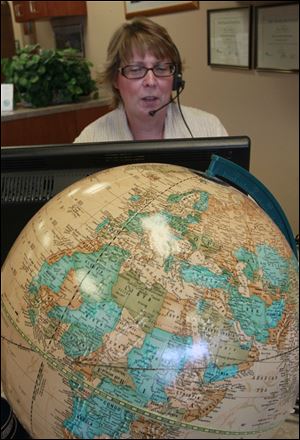
Some businesses still feel effects of 9/11 attacks
9/11/2011
Travel agent Mary Gillingham of Central Travel in Sylvania remembers trying to help stranded travelers return home after flights were grounded on 9/11.
Central Travel was one of the first businesses in the Toledo area to feel the national economic impact of the Sept. 11, 2001, terrorist attacks.
President and Chief Executive Jani Miller said bookings at the Toledo-based travel agency dropped 25 percent right after 9/11 as travelers coped with concerns over safety and increased security measures. Though she said business eventually returned to pre-9/11 levels, the events left a lasting impression on the business. "It was a gradual return to normalcy," said Ms. Miller, whose company had sales of more than $15 million last year.
Economists say terrorist attacks 10 years ago generated travel restrictions and increased spending on security that affect businesses to this day, including those in northwest Ohio."I think 9/11 changed the world economy forever in some ways," said George Mokrzan, chief economist for Huntington Bancorp in Columbus.
Barry Bosworth, a senior fellow with the Brookings Institution in Washington, said the most significant change to the U.S. economy after 9/11 is an increased focus on military and security-related spending, including $100 billion to $125 billion spent per year to support the wars in Iraq and Afghanistan.
"There was a shift in the composition of U.S. industry toward defense and away from consumer and other capital goods," Mr. Bosworth said.
Increased security spending can be seen in both the public and private sectors and across industries and geographical areas of the country, he said.
Those security costs include the adoption of tighter security measures in the U.S. aviation industry during the last decade, Mr. Mokrzan said. "All you need to do is go to the airport and see the changes there," he said.
FirstEnergy Corp., the Akron utility that owns Toledo Edison, is one company that has invested heavily in security in the aftermath of 9/11. The utility has spent $169 million in the last 10 years to upgrade technology and physical security at its statewide facilities, spokesman Jennifer Young said. That includes adding physical barriers and security personnel at the Davis-Besse nuclear power station near Oak Harbor in Ottawa County, protecting the utility's computer systems from cyber attacks, and developing a management plan that would take effect in case of terror attacks, natural disasters, or other emergencies.
"In the years after Sept. 11, we just thought it would be a prudent thing to develop," Ms. Young said.
Estimates of 9/11's damage vary widely, ranging from $35 billion to $4 trillion. Some economists don't think it's possible to figure out how much 9/11 has cost businesses and consumers after 2002 because so much has happened since then. Among other things, there has been a real estate bubble followed by a mortgage meltdown that led to a financial crisis that fed the Great Recession -- the most severe economic downturn since World Ward II.
Though employment and housing values fell precipitously in metro Toledo during the recent recession, Mr. Mokrzan said he doesn't believe the economic downturn can be traced to 9/11.
It seems other experts would agree with that assessment. A 2007 study from the Stanford Institute for Economic Policy Research said 9/11 led to the loss of 1 million jobs during the four months after the attacks. However, the report says the economic decline was "followed by a strong rebound with little longer-term impact."
Though the economic aftermath of 9/11 didn't last for Central Travel, Ms. Miller noted that the attacks forever changed the way people travel.
Stricter travel regulations in the immediate aftermath of 9/11 aren't stopping people from going on vacation now, Ms. Miller said. But they are a continued disruption with which travelers must deal.
"Everyone knows it's not as pleasant as it used to be to fly," she said.
This report includes information from the Associated Press.
Contact Sheena Harrison at: sharrison@theblade.com or 419-724-6103.